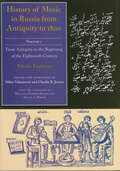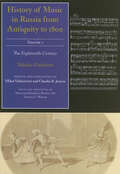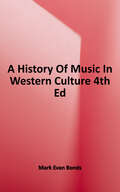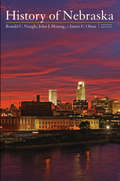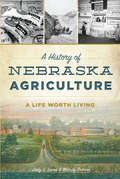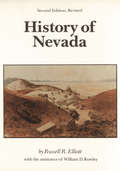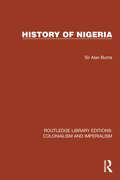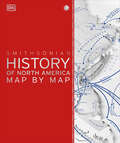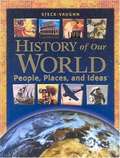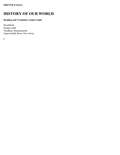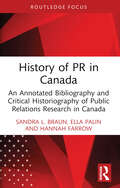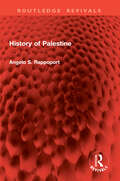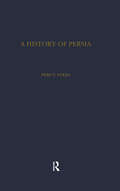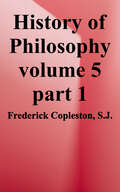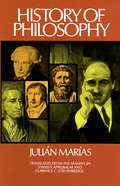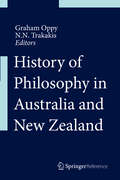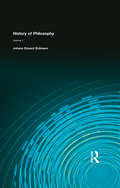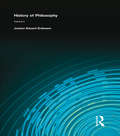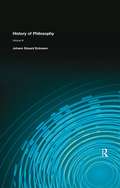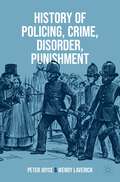- Table View
- List View
History of Music in Russia from Antiquity to 1800, Volume 1: From Antiquity to the Beginning of the Eighteenth Century (History of Music in Russia from Antiquity to 1800 #1)
by Nikolai FindeizenIn its scope and command of primary sources and its generosity of scholarly inquiry, Nikolai Findeizen's monumental work, published in 1928 and 1929 in Soviet Russia, places the origins and development of music in Russia within the context of Russia's cultural and social history.Volume 2 of Findeizen's landmark study surveys music in court life during the reigns of Elizabeth I and Catherine II, music in Russian domestic and public life in the second half of the 18th century, and the variety and vitality of Russian music at the end of the 18th century.
History of Music in Russia from Antiquity to 1800, Volume 2: The Eighteenth Century (History of Music in Russia from Antiquity to 1800 #2)
by Nikolai FindeizenIn its scope and command of primary sources and its generosity of scholarly inquiry, Nikolai Findeizen's monumental work, published in 1928 and 1929 in Soviet Russia, places the origins and development of music in Russia within the context of Russia's cultural and social history.Volume 2 of Findeizen's landmark study surveys music in court life during the reigns of Elizabeth I and Catherine II, music in Russian domestic and public life in the second half of the 18th century, and the variety and vitality of Russian music at the end of the 18th century.
History of Music in Western Culture
by Mark Evan BondsLearn the History of Music, through Music. A History of Music in Western Culture, 4/e is based on the premise that the best way to convey the history of Western music is to focus on specific works of music. The text is structured around a carefully selected repertory of music that reflects the development of the art form throughout time. Mark Evan Bonds helps readers gain a broad understanding of the nature of music, its role in society, and the ways in which these have changed over time. <p><p>A History of Music in Western Culture challenges students to think critically about the nature of music and its past. Once familiar with a representative body of music, students can better grasp the evolution of musical style and music's changing uses within the Western tradition. Students will have a sound basis from which to explore other musical works. This text builds its narrative around the core repertory represented in the Anthology of Scores and the corresponding sets of compact discs. Learning Goals -Upon completing this book, students will be able to: - Grasp the evolution of musical style and music's changing uses within the Western tradition. - Have a sound basis from which to explore other musical works. - Gain a better understanding of the nature of music.
History of Nebraska
by James C. Olson Ronald C. Naugle John J. MontagHistory of Nebraska was originally created to mark the territorial centennial of Nebraska and then revised to coincide with the statehood centennial. This one-volume history quickly became the standard text for the college student and reference for the general reader, unmatched for generations as the only comprehensive history of the state. This fourth edition, revised and updated, preserves the spirit and intelligence of the original. Incorporating the results of years of scholarship and research, this edition gives fuller attention to such topics as the Native American experience in Nebraska and the accomplishments and circumstances of the state’s women and minorities. It also provides a historical analysis of the state’s dramatic changes in the past two decades.
History of Nebraska Agriculture, A: A Life Worth Living (American Heritage)
by Jody L. DobsonOnce known as the “Great American Desert,” Nebraska’s plains and native grasslands today make it a domestic leader in producing food, feed and fuel. From Omaha to Ogallala, Nebraska’s founding farmers, ranchers and agribusiness leaders endured hardships while fostering kinships that have lasted generations. While many continued on the trails leading west, others from around the world stayed, seeking a home and land to cultivate. American Doorstop Project co-founders and authors Jody L. Lamp and Melody Dobson celebrate the state’s forgotten and untold agricultural history, highlighting more than a century and a half of agriculture industry, inventions and innovations in the Cornhusker State.
History of Nevada: (Second Edition)
by Russell R. Elliott William D. RowleyThis updated edition of History of Nevada is still the most comprehensive one-volume economic, political, and social history of a state that was once thought of as "a bridge to somewhere else." It will be welcomed by students and general readers.
History of Nigeria (Routledge Library Editions: Colonialism and Imperialism #30)
by Sir Alan BurnsHistory of Nigeria (1969) was first published in 1929 and completely revised by its author, and gives the history of Nigeria from before its first encounters with the British, through colonial rule, and up to independence in 1960. It describes the peoples of Nigeria and the British conquest and colonial administration, and is full of detailed and valuable information relating to trade and industry, transport, housing, land tenure, education, religion and tribal customs. Appendices feature royal genealogies and the texts of treaties.
History of North America Map by Map (DK History Map by Map)
by DKA visual journey through the history of North America via a series of engaging, detailed maps, explaining key events and eras from prehistory to the 21st century.Specially created maps tell the story of this vast region: the first human populations and the lands of indigenous peoples; the complex ancient civilizations that arose in Mexico; the first Westerners to arrive on the shores, from the Vikings to the Mayflower; early settlements and the devastating consequences for the indigenous population; the stories of enslaved people and the abolition of slavery; the American Revolution and Civil War that shaped the modern United States; the Mexican-American War; the founding of Canada; and the industrial era and the growth of a global superpower. Brand new maps are accompanied by historic maps, documents, and artefacts, while timelines clearly lay out the chronology of events. Each era is introduced and explained, while features offer a closer look at selected moments. Whether for casual browsing or a deep dive into the past, History of North America Map by Map is essential reading for anyone who wants to know more about this fascinating land.
History of Our Nation: 1865 to the Present
by Wayne E. King John L. NappHistory of Our Nation: 1865 to the Present explores United States history from the start of Reconstruction through the 2004 presidential election.
History of Our Nation: Beginnings to 1920
by Wayne E. King John L. NappThis book is a story about the United States from its beginnings through World War I. As you read the units, chapters and lessons of this book, you will learn about the important people and events that shaped the U.S. history.
History of Our World: Early Ages
by Heidi Hayes Jacobs Kate Kinsella Kevin Feldman Dorling Kindersley Publishing Staff Michal L. LevasseurTextbook of early and classical history
History of Our World: People, Places, and Ideas
by Henry BillingsThe book provides lessons designed for remedial readers and special needs children. This book offers three proven approaches to the study of World History: standards-driven global approach, a practical and instructional skills development approach and a reading approach. The History of Our World focuses on building fundamental social studies knowledge and skills in the context of an effective reading approach to social studies content.
History of Our World: Reading and Vocabulary Study Guide
by Heidi Hayes Jacobs Kate Kinsella Kevin Feldman Dorling Kindersley Publishing Staff Michal L. LeVasseur Prentice Hall Direct Education StaffThe Reading and Vocabulary Study Guide was designed to help you understand World History content. It will also help you build your read¬ing and vocabulary skills. Please take the time to look at the next few pages to see how it works!
History of PR in Canada: An Annotated Bibliography and Critical Historiography of Public Relations Research in Canada (The History of Public Relations)
by Sandra L. Braun Ella Palin Hannah FarrowA first of its kind, this annotated bibliography provides an overview of the development of public relations research in the Canadian context. A valuable resource for researchers, students or practitioners, this bibliography surveys the landscape of public relations research in Canada. It orientates readers to this unique history, identifies gaps in research, suggests topics of future research, and offers critical historiography.This reference work will be of interest to scholars, students and practitioners in the fields of strategic communications, marketing or communications, providing a greater understanding of communications research in various Canadian contexts such as government, industry, corporate and nonprofit.
History of Palestine (Routledge Revivals)
by Angelo S. RappoportFirst published in 1931, History of Palestine is the dramatic picture of the Holy Land to which Jews returned after many centuries. The author has written the history of Palestine of 4000 years with the mind of the scholar and the heart of the religious mystic. Divided into three parts—pre-Israelite Palestine; Palestine, the promised land of the Hebrews; and Palestine, the holy land of Christendom, this book will appeal to students and researchers of history and general readers interested in the topic.
History of Persia (Routledge Library Editions)
by Sir Percy SykesThis is a facsimile of a classic history first published by Macmillan in 1915 and issued in two further editions by Routledge and Kegan Paul. Sir Percy Sykes was an explorer, consul, soldier and a spy who lived and travelled in Persia over a period of twenty-five years. This two-volume collection provides a comprehensive history of Persia from Alexander the Great, through British, French and Russian colonialism, to the early twentieth century oil industry.With a new introduction by Sykes' biographer, Antony Wynn, this comprehensive history provides essential background reading to students and academics of Persia.
History of Philosophy
by S. J. Frederick CoplestonConceived originally as a serious presentation of the development of philosophy for Catholic seminary students, Frederick Copleston's nine-volume A History Of Philosophy has journeyed far beyond the modest purpose of its author to universal acclaim as the best history of philosophy in English. <p><p>Copleston, an Oxford Jesuit of immense erudition who once tangled with A.J. Ayer in a fabled debate about the existence of God and the possibility of metaphysics, knew that seminary students were fed a woefully inadequate diet of theses and proofs, and that their familiarity with most of history's great thinkers was reduced to simplistic caricatures. Copleston set out to redress the wrong by writing a complete history of Western Philosophy, one crackling with incident an intellectual excitement - and one that gives full place to each thinker, presenting his thought in a beautifully rounded manner and showing his links to those who went before and to those who came after him.
History of Philosophy
by Julian MariasThorough and lucid survey of Western philosophy from pre-Socratics to mid 20th century: major figures, currents, trends, literature, significance, and more. Valuable section on contemporary philosophy -- Brentano, Ortega, Heidegger, others. One of the best elementary history of philosophy available. "Brevity and clarity of exposition..." -- Ethics.
History of Philosophy in Australia and New Zealand
by Graham Oppy N. N. TrakakisThe History of Philosophy in Australia and New Zealand is a comprehensive account of the historical development of philosophy in Australia and New Zealand, from the establishment of the first Philosophy Chair in Australasia in 1886 at the University of Melbourne to the current burgeoning of Australasian philosophy. The work is divided into two broad sections, the first providing an account of significant developments and events during various periods in the history of Australasian philosophy, and the second focusing on ideas and theories that have been influential in various disciplines within Australasian philosophy. The work consists of chapters contributed by various philosophers, on specific fields of inquiry or historical periods within Australasian philosophy.
History of Philosophy: Volume I
by Erdmann, Johann EduardFirst published in 2002. Routledge is an imprint of Taylor & Francis, an informa company.
History of Philosophy: Volume II
by Erdmann, Johann EduardFirst published in 2002. Routledge is an imprint of Taylor & Francis, an informa company.
History of Philosophy: Volume III
by Erdmann, Johann EduardFirst published in 1964 and reprinted in 2013. This is a text is a history of Philosophy as compiled by Johann Eduard Erdmann, professor of Philosophy in the University of Halle and translated into English by Williston S. Hough. This is Volume III of three and covers German Philosophy since Hegel
History of Policing, Crime, Disorder, Punishment
by Peter Joyce Wendy LaverickThis engaging textbook provides a broad and unique coverage of the key historical events that shaped ideas in criminology, criminal justice and policing from the late seventeenth century to the early twenty-first century in England and Wales. It vividly illustrates the multi-disciplinary nature of criminology and penology by providing important insights into the social and political issues that shaped the development and operations of the criminal justice system and its responses to both crime and disorder. Using key text boxes, this book highlights key people, theorists, foundational principles and events throughout. Part One discusses the nature of crime and forms of punishment between 1689 and 1750 and the penological concerns regarding the aims of punishment. Part Two focuses on crime and disorder between 1750 and 1850, examining the impact of urbanization on criminal activity and it considers the background and state responses to key episodes of public disorder. Part Three covers the development of policing 1689-1856 and the contribution to policing made by reformers and the implementation of police reform. Part Four deals with a number of issues affecting crime and punishment between 1850 and 1920 including episodes such as Irish Home Rule within the context of ‘high policing’. It evaluates changes to the nature and role of prisons that occurred in this period. This student-friendly book contains end of chapter questions which summarise and enable further discussion.
